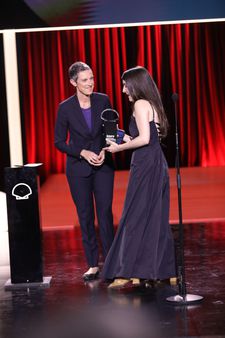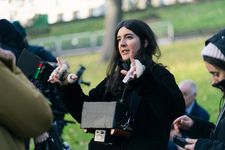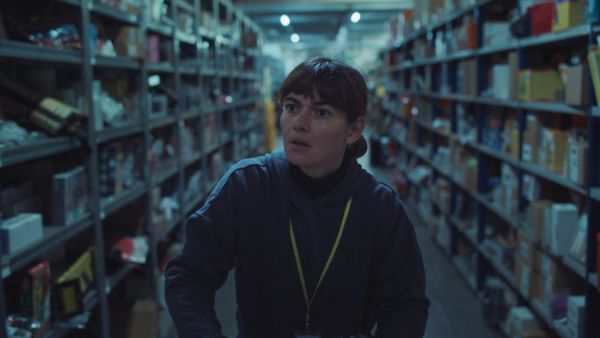This year’s San Sebastian Film Festival Official Competition was a strong one, featuring veteran filmmakers including Albert Serra - who ultimately took the top prize Golden Shell for his documentary Afternoons Of Solitude - Mike Leigh and François Ozon. There was room for new voices, too, including that of Portuguese filmmaker Laura Carreira, whose debut feature On Falling charts a handful of days in the life of a lonely migrant warehouse picker working in Scotland. The film, which stars Joana Santos as Aurora, a woman who struggles to find connections after relocating from her homeland to Edinburgh, won the Silver Shell for best director at the festival. We caught up with Edinburgh-based Carreira in Spain to chat about expanding on ideas from her short films, including The Shift, living precariously and loneliness in the modern world.
The gig economy is evidently something that already interested you in your short films, tell me a bit about expanding on those themes.
Laura Carreira: I think a lot of the ideas that came to this feature were found in the work that I started in the shorts because I think by the time I finished the shorts, there were all these fragments of things that I wanted to go into that I couldn't in the shorts.
I assume you were partially inspired by the massive Amazon warehouse there is in Fife?
LC: I got to visit, yes. It's one of the largest warehouses in the UK. They run public tours that you can go and explore. I did it before Covid happened. And it ended up influencing one of the scenes in the film. When I started writing On Falling, I started trying to speak to pickers. And so I spoke to quite a few of them to try to understand, not just the work routines - I was really keen to try and get that right - but also the dynamics with other colleagues and what life is like outside of the work that all those little aspects influenced a lot of the scenes.
It came from that experience of feeling a little strange about going to a big warehouse and seeing people work. They never introduced us to any of the workers to have a chat with them. It was very much like come and have a look, we'll tell you, but it felt a little bit like a PR campaign. And then, obviously, I spoke to different pickers who work for different companies. An interesting thing I discovered while writing it, for example, is that they're not aware of what the targets actually are. So they are following the timing, but sometimes, and a lot of people said this, it was really hard for them to even gauge if they were doing well or not, because there was an algorithm that was defining how well they were doing. So some days people would think, “Oh, I don't think I've done that well”, and they would say, “You're a picker of the day”, and other days they thought "I'm totally killing it". And it'd be like, "You're not doing well".
This is a very anonymous kind of view of Scotland. It's quite unusual to see that since nearly always directors go in for showing a monument in Edinburgh - you just show a bit of Princes Street Gardens that many non-locals wouldn’t recognise. Also you employ a diversity of Scottish accents, can you tell me a bit about those choices?
LC: It's really important because I wanted to show how diverse Scotland was. In terms of the city, I think it is to do with the character. I think this is a character who lives so much between the flat and the warehouse that it almost felt important to feel her disconnection with the city. It was to have that sense of separation from the ‘other’ world.
In your film some characters chat about a TV show called The Golden Chain, you could have called your film that.
LC: I think someone suggested that at some point.
It would fit because she is part of the chain between us and the corporate entities and capitalist sellers. I’m interested in how you use these imaginary TV shows, The Golden Chain and another the workers talk about, The Dark Road. Even though they’re talking about them, we never actually learn what they’re about. That captures the way that even when we are communicating with people we see every day we often don’t say very much at all.
LC: When I was writing the film, I realised that the theme of impoverishment was not just about the character’s experience and routine but also to do with our conversations. When we're so tired and the way we're living, our life is defined by work. I think it's consuming us and I think it's consuming us in ways that we're almost too close to really see.
We see that in the film. We’re all living our lives moment to moment and not necessarily thinking about what we’re doing with them in a way and she’s forced to confront that in a way.
LC: I think the way we live forces us to live in a very passive way. The job is boring and when you talk about the series that's another area where we’re viewers or spectators and I think there's that sense of the lack of agency.
Turning to the construction of the film, the sound design is interesting. Things like the washer being a churn noise in her kitchen, the beep of the scanner at work. I guess that’s also a fine balance, to incorporate this industrial element without making it seem like a dystopian future.
 |
| Laura Carreira receives her Silver Shell from Carole Scotta for On Falling Photo: Courtesy of San Sebastian Film Festival/Alex Abril |
I suppose that’s why the phone is a focal point for her in some ways. It’s something she’s controlling.
LC: For sure, and it’s an escape. I do think we relate to our phones in a very social way, it’s a sort of social support.
Regarding the character, I feel as though you wanted to make sure not to generalise about everyone who works in that environment. It’s quite a fine balance because there are dystopian elements but, equally, not everyone who works in those environments has that life.
LC: All these themes, I was picking them up from things people were saying. To a degree, I think anyone who has lived like Aurora at a point in their lives experienced bits of the world in this way. Loneliness was a big thing for me that this character is having to endure. It's brutal but it's not something that we talk a lot about and yet the rates of loneliness are going up and up. More and more people are experiencing feeling lonely, and I thought this will be something that Aurora's experienced but other people will also relate to that.























